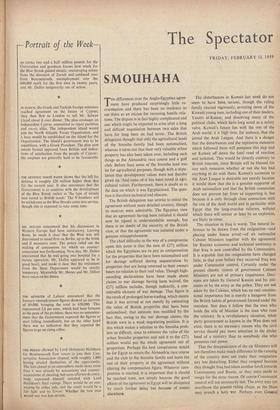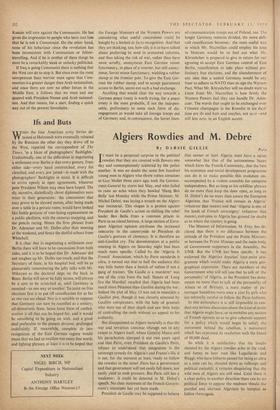SMOUHAHA
THE differences over the Anglo-Egyptian agree- ment have produced surprisingly little re- crimination and there has been no tendency to use them as an excuse for resuming hostile rela- tions. The dispute is in fact highly complicated and one which might be expected to arise after a long and difficult negotiation between two sides that have for long been on bad terms. The British delegation thought that only the agricultural lands of the Smouha 'family had been nationalised, whereas it turns out that their very valuable urban property has also been taken over, including such things as the Alexandria race course and a golf club. Before Suez some of the Smouha land was let for agricultural purposes, though with a stipu- lation that development values were not thereby given up. And some of it has been taxed at agri- cultural values. Furthermore, there is doubt as to the date on which it was Egyptianised. The ques- tion is therefore technical and obscure.
The British delegation was unwise to initial the agreement without more detailed scrutiny, though its motives were admirable. The Egyptian view that an agreement having been initialed it should now be signed is understandable enough, but there is no doubt of the sincerity of the British view, or that the agreement was initialed under a genuine misapprehension.
The chief difficulty in the way of a compromise upon this point is that the sum of L271 million which the Egyptians are to pay as compensation for the properties that have been nationalised and for damage suffered during sequestration by properties that are being returned to their owners bears no relation to their real value. Though high- sounding declarations have been made about claims to war damage having been waived, the £271 million includes, though indirectly, a con- siderable element of war damage. That figure is the result of prolonged horse-trading, which means that it was arrived at not merely by estimating the value of British properties that have been nationalised; that estimate was modified by the fact that, owing to the war damage claims, the British were in a weak negotiating position. It is this which makes a solution to the Smouha prob- lem so difficult, since to estimate the value of the urban Smouha pioperties and add it to the £27+ million would put the whole agreement out of proportion. Perhaps the best compromise would be for Egypt to return the Alexandria race course and the club to the Smouha family and leave the rest of their property in the agreement without altering the compensation figure. Whatever com- promise is reached, it is important that it should be reached soon, not simply because the good effects of the agreement in Egypt will be dissipated by much further delay but because of events elsewhere. The disturbances in Kuwait last week do not seem to have been serious, though the ruling family reacted vigorously, arresting some of the Kuwaiti young men, including one of their leaders, Yassim al-Katani, and dissolving many of the political clubs, which have long acted as a safety valve. Kuwait's future lies with the rest of the Arab world; it is high time, for instance, that she joined the Arab League. And there is a danger that the disturbances and the repressive measures which followed them will postpone this step and set Kuwait off down the fatal road of reaction and isolation. This would be directly contrary to British interests, since Britain will be blamed for any such measures whether or not she has had anything to do with them. Kuwait's accession to the Arab League is desirable not merely because it would show that she is a genuine supporter of Arab nationalism and that the British connection does not prevent her from so supporting it, but because it is only through close connection with the rest of the Arab world and in particular with Egypt that the long-overdue reforms, without which there will sooner or later be an explosion, are likely to come.
The situation in Iraq is worse. The natural in- ference to be drawn from the resignation—and placing under house arrest—of six nationalist Cabinet Ministers together with the agreement for Russian economic and technical assistance is that Iraq is now controlled by the Communists. It is arguable that the resignations have changed little, in that even before they occurred Iraq was under Communist control. Certainly under the present chaotic system of government Cabinet Ministers are not of primary importance. Deci- sions are taken by General Kassim and his inti- mates or by the army or the police. They are not taken by the Cabinet, which has no real constitu- tional importance but is merely a hangover from the British habits of government formed under the mandate. Nor does it follow that the man who holds the title of Minister is the man who runs the ministry. In a revolutionary situation, when party government as known in the West does not exist, there is no necessary reason why the civil service should pay more attention to the titular head of a ministry than to somebody else who possesses real power.
That the disappearance of the six Ministers will not therefore make much difference to the running of the country does not make their resignation any less disturbing. Either they resigned because they thought Iraq had taken another lurch towards Communism and Russia, or they were made to resign for the same reason. Of course Communist control will not necessarily last. The army may yet overthrow the present ruling clique, or the Shias may preach a holy war. Perhaps even General Kassim will turn against the Communists. He has given the impression to people who have met him that he is not a Communist. On the other hand, none of his behaviour since the revolution has been inconsistent with Communism or fellow- travelling. And if he is neither of these things he must be a remarkably weak or unlucky politician.
if Iraq is going Communist there is nothing that the West can do to stop it. But since even the most unrepentant Suez warrior must agree that Com- munism is .a greater danger than Arab nationalism, and since there are now no other forces in the Middle East, it follows that we must end our quarrel with President Nasser and Arab national- ism. And that means, for a start, finding a quick way out of the present Smouhaha.







































 Previous page
Previous page